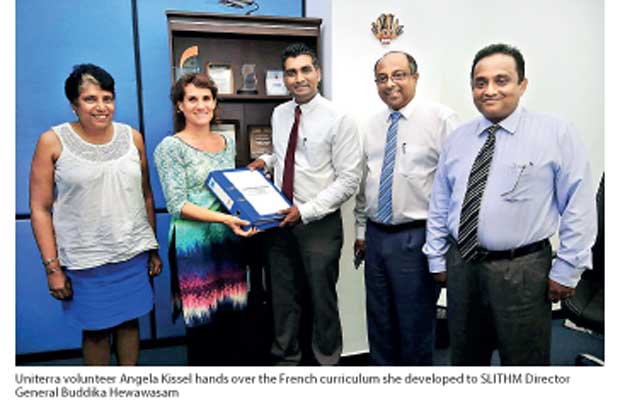20 Nov 2017 - {{hitsCtrl.values.hits}}

The tourism authorities are working towards uplifting Sri Lanka’s hospitality training to world-class standards through collaborations with foreign institutions.
The country’s premier hospitality training institution, the Sri Lanka Institute of Tourism and Hospitality Management (SLITHM), is collaborating with the World University Service of Canadain (WUSC) curriculum development and many other areas. The WUSC is currently managing two specially designed programmes in Sri Lanka in association with the SLITHM, namely Advancing Specialized Skills for Economic Transformation (ASSET) and Uniterra, based on the shared values of improving quality education in the tourism sector.
The SLITHM is the only state educational institution in the tourism and hospitality sector with eight schools across Sri Lanka and is committed to providing high-quality education in travel and tourism by constantly adapting to the evolving needs of Sri Lanka’s tourism industry. The end result is that the SLITHM graduates are provided holistic training that equips them to provide the highest quality hospitality service.
In this regard, the WUSC and SLITHM have had an extremely fruitful partnership in developing English syllabi at the craft, certificate, intermediate and advanced levels. These syllabi not only outline high-quality English language education but are also tailored toward the real needs of Sri Lanka’s tourism industry, with specific terminologies and pronunciation.
In addition to the English syllabi, the WUSC’s involvement has allowed for the development of a French syllabus at the certificate level as well as content on French wines and cuisine with proper pronunciation and terminology.
“Language skills are essential in the tourism industry. Knowledge in commonly spoken languages like English and French allow the SLITHM’s graduates to work much more productively by easing communication gaps between industry professionals and tourists,” said SLITHM Chairman Sunil Dissanayake.
Going above and beyond curriculum development, the WUSC volunteers have worked with the SLITHM lecturers and staff to ensure that programmes are delivered in an effective manner with modern and innovative teaching methods that focus on oral and listening activities in order to create a more meaningful and dynamic learning environment.
“By both developing material and ensuring quality implementation through the provision of native English and French-speaking volunteers, the WUSC facilitated the creation of high-quality language programmes that equip students with the language skills necessary for their future careers,” observed SLITHM Director General Buddika Hewawasam.
The WUSC’s Uniterra programme has worked closely with the Koggala campus of the SLITHM, sponsoring 460 students’ course fees, uniforms and travel. The WUSC’s support for the Koggala campus has amounted to approximately Rs.10.6 million. In order to further improve the language skills of the SLITHM students, the WUSC has sponsored the introduction of language learning software, DynEd, including installation and fees associated with the programme. In addition, the WUSC provided the relevant electronic devices needed to run the DynEd software.
In addition, the WUSC has contributed to the SLITHM Anuradhapura through employment-based training targeting 100 unemployed youths from the Puttalam District. This group was trained at craft-level in food and beverage, housekeeping and cookery assistance, allowing them to be employed in top-level hotels in the area.
The SLITHM is also partnering the WUSC’s ASSET programme, which is focused on the shortage of skilled labour in specific sectors of the economy, including hospitality and tourism. At the Passikudah campus of the SLITHM, the WUSC’s contribution involves working to attract individuals to programmes by helping to overcome the challenges. The transportation and daily costs of attending the SLITHM’s training programmes are common challenges rural students face and they are one aspect of how the WUSC works with the SLITHM to boost the tourism industry.
The WUSC-SLITHM partnership has also helped to solve the other problems such as lack of information and language barriers. Another factor that has helped tackle many challenges has been the WUSC’s large regional network, which the SLITHM can access to promote its programmes and attract new people.
Recently, through partnership with ASSET, the SLITHM has been able to open the first hospitality-training institute in Jaffna. This will combat unemployment in the area and meet the growing need for highly trained hospitality and tourism professionals in the region.
By taking down the barriers to education in the tourism industry and aiding in creating awareness regarding the industry, the WUSC and SLITHM are working towards growing Sri Lanka’s tourism sector as a whole, which is now a vital sector in the Sri Lankan economy.
29 Dec 2024 1 hours ago
29 Dec 2024 2 hours ago
29 Dec 2024 3 hours ago
29 Dec 2024 3 hours ago
29 Dec 2024 4 hours ago